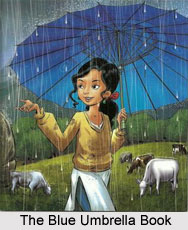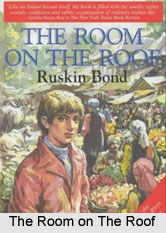 Books by Ruskin Bond mostly deal with the contemporary India. India of his time remains the central theme of his writings. These are the authentic representations of the socio-political crosscurrents in the then India. Bond`s characters often belong to the huge concourse of the common people. Pubescent passion is the theme, which he successfully handled in his books. Moreover in some of his masterpieces Ruskin Bond, with a rare mastery has etched out the pristine freshness of nature as is found in the laps of the Himalayas, his native place.
Books by Ruskin Bond mostly deal with the contemporary India. India of his time remains the central theme of his writings. These are the authentic representations of the socio-political crosscurrents in the then India. Bond`s characters often belong to the huge concourse of the common people. Pubescent passion is the theme, which he successfully handled in his books. Moreover in some of his masterpieces Ruskin Bond, with a rare mastery has etched out the pristine freshness of nature as is found in the laps of the Himalayas, his native place.
Bond`s Literary Style
Bond`s most writings show the influence of the social life of the hilly life of Himalaya`s foot hills. He spent his childhood in that region. His literary style is different in the way that it tries to make its readers understood the landscape through carefully chosen words. While going through his text his awesome description of flora and fauna captivates the attraction of the readers.
In the span of his writing career covering thirty five years, he wrote hundred short stories, essays, novels and more than thirty books for children. Three collections of short stories, The Night Train at Deoli, Time Stops at Shamli and Our Trees Still Grow in Dehra have been published through Penguin India. He has edited two anthologies too named The Penguin Book of Indian Ghost Stories and The Penguin Book of Indian Railway Stories. Bonds writing are greatly influenced by the hills, and the valley of Dehradun.
Few Important Books by Ruskin Bond
•The Room on The Roof - Rusty, a sixteen-year-old Anglo-Indian boy, is orphaned, and has to live with his English guardian in the claustrophobic European part of town, in Dehra Dun. Unhappy with the strict ways of his guardian, Rusty runs away from home to live with his Indian friends. Plunging for the first time into the dream-bright world of the bazaar, Hindus festivals and other aspects of Indian life, Rusty is enchanted ... and is lost forever to the prim properties of the European community.
•Our Trees still grow in Dehra - Fourteen engaging stories from one of India`s master story-tellers Semi-autobiographical in nature, these stories span over the period from the author`s childhood to the present. We are introduced, in a series of beautifully imagined and crafted cameos, to the author`s family, friends, and various other people who left a lasting impression on him. In other stories we revisit Bond`s beloved Garhwal hills and the small towns and villages that he has returned to time and again in his fiction. Together with his well-known novella, A Flight of Pigeons (which was made into the film Junoon), which also appears in this collection, these stories once again bring Ruskin Bond`s India vividly to life.
•The Blue Umbrella - This is a story of a girl, Biniya, living in a village in Garhwal region. Her blue umbrella is the focal point of her life and a common envy of the remote village. A shopkeeper Ram Bharosa is particularly enamored of the umbrella and his apprentice offers to steal it for him. He loses the respect of the villagers for his misdeed and is banished from the village. At the end of the story, Biniya takes pity on the isolated man, and breaks the ban imposed on him and gifts him the blue umbrella. This book also made its way to the silver screen by a movie made by Vishal Bharadwaj.
•A Flight of Pigeons - The story is about Ruth Labadoor and her family (who are British) who take help of Hindus and Muslims to reach their relatives when her father is killed in a church by the Indian rebels. In the backdrop of the story, the events of the Revolt of 1857 are presented artistically in bits and pieces. Finally, the story ends with English army once again taking over the city almost after a year.
 It has taken the better half of fifty years for Ruskin Bond, one of India`s most prolific writers in English for adults and children, to receive the critical attention that he deserves. Quietly, Bond has been writing novels, poems, essays, and countless short stories for his mostly Indian fans since the 1950s, yet critics have tended to pay more attention to expatriate Indians rather than the indigenous, especially those known mostly for writing children`s literature. Meena Khorana, in her critical biography of Bond, therefore has the daunting task of making up for neglect and lost time, and she does an impressive job of covering a vast career in a slim volume. Not only does she give the most complete and sophisticated look at Bond up to now, but her work also helps to define the post-independence Indian literary identity and its relation to British influences.
It has taken the better half of fifty years for Ruskin Bond, one of India`s most prolific writers in English for adults and children, to receive the critical attention that he deserves. Quietly, Bond has been writing novels, poems, essays, and countless short stories for his mostly Indian fans since the 1950s, yet critics have tended to pay more attention to expatriate Indians rather than the indigenous, especially those known mostly for writing children`s literature. Meena Khorana, in her critical biography of Bond, therefore has the daunting task of making up for neglect and lost time, and she does an impressive job of covering a vast career in a slim volume. Not only does she give the most complete and sophisticated look at Bond up to now, but her work also helps to define the post-independence Indian literary identity and its relation to British influences.
The first five chapters of Khorana`s book follow Ruskin Bond`s life, with a particular focus on his childhood and adolescence, the periods most influential in his writing, in the mountains and cities of northern India. We see the young Ruskin migrate from his home in India, to Britain for a short, but crucial period, and back to the foothills of the Himalayas, where he has stayed, more or less, ever since. Along the way, he deals with his mixed British and Indian identity and perseveres in his tireless effort to survive as a writer. While Khorana is a careful biographer, there were a few moments when I was hoping for a bit more, particularly on Bond`s failed proposal to a Vietnamese woman in Britain, and his going to trial in India on charges of obscenity, of all things. Still, the real value in the biographical section is in Khorana`s gliding naturally into critical discussions of Bond`s usually autobiographical work, including The Room on the Roof (1956), The Young Vagrants (1957), and many short stories and poems. Khorana distances Bond from those to whom he is often compared, such as Kipling, by aligning him with other post-independence writers like Godden and Macfarlane, who, as she claims, along with Bond, tend to deconstruct the colonial novel. Moving away from the biographical format, Chapters 6 and 7 are insightful critical essays focusing on Bond`s vision of childhood and his use of natural imagery, with a focus on his writing for children. In the last chapter, she admirably defends Bond from his detractors, though at this point it hardly seems necessary.
Awards Won by Bond"s Books
•The Room on the Roof is the first novel written by Ruskin Bond. The book also fetched him the prestigious John Llewellyn Rhys Memorial Prize in 1957.
•Ruskin Bond received the Sahitya Academy Award for Our Trees still grow in Dehra in 1992.
•1999 Padma Shri Award for children`s literature.













